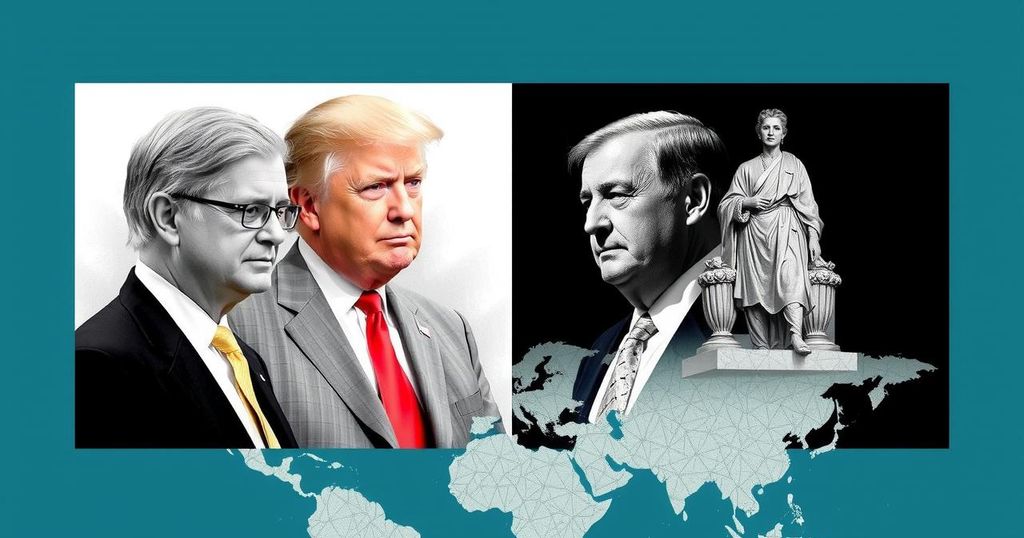Outgoing President Joe Biden is attempting a ban on oil drilling in U.S. waters to promote a net-zero carbon emissions legacy, while President-elect Trump, known for his pragmatic but controversial stance on climate change, may face challenges in foreign policy, including NATO responsibilities and U.S.-Israel relations. Trump’s simplistic policies might encounter resistance from a Republican-controlled Congress, adding to the complexity of his transition into power.
In a significant move that underscores his environmental commitment, outgoing President Joe Biden is attempting to ban oil drilling in U.S. coastal waters, specifically in the Atlantic, Pacific, and east of the Gulf of Mexico. This initiative, coming shortly before Donald Trump’s inauguration, is perceived as part of Biden’s strategy to secure a legacy focused on achieving net-zero carbon emissions by 2050 in the world’s largest economy. Notably, this presidential ban cannot be reversed by Trump, who has publicly denied the existence of climate change and opposes measures aimed at combating it.
As nations globally engage in efforts to address climate change, failure to adopt similar strategies could result in the U.S. becoming increasingly isolated among leading economies, particularly given its status as the largest emitter of greenhouse gases. On a separate front, President Biden has been a staunch ally of Ukraine amid its ongoing conflict with Russia. In contrast, Trump’s administration is expected to reassess the financial and military support extended to Ukraine during Biden’s term. However, challenges remain as Trump, known for his pragmatism and a nontraditional approach, may struggle to utilize his rapport with President Vladimir Putin to influence an end to the war.
Moreover, Trump possesses distinct views regarding NATO operations and member contributions, advocating for increased defense spending among European allies to meet a benchmark of two percent of their GDP. This endeavor is anticipated to be challenging, particularly for economies such as Germany, without even addressing the concerns of smaller NATO members. In the context of U.S.-Israel relations, Trump’s administration is expected to maintain steadfast support for Israel, following Biden’s approach.
While Biden’s government sought to negotiate a humanitarian ceasefire amidst escalating tensions in Gaza, these efforts faced considerable obstacles, particularly in persuading Israeli Prime Minister Benjamin Netanyahu. Biden’s threats to curtail military aid if civilian attacks did not cease ultimately did not materialize into action, casting doubt on the efficacy of U.S. influence over Israel under Trump’s tenure. As the conflict extends beyond Israel and Palestine, Trump may find limited flexibility in addressing global issues, such as those in Ukraine and the Taiwan Strait.
Trump’s foreign policy vision remains largely constrained to imposing tariffs on international trade partners, including Canada, Mexico, India, and China. However, when confronted with matters beyond trade, he may revert to conventional U.S. foreign policies advocating for democracy, even if the application of such principles could be seen as hypocritical. Additionally, Trump will likely face challenges to implement his policies due to the Republican majority in Congress, with lawmakers potentially resisting his more simplistic strategies and insisting on more nuanced policy discussions.
The article discusses the differing approaches of President Joe Biden and President-elect Donald Trump regarding key environmental, foreign policy, and military aid issues. The context involves Biden’s intentions to solidify a legacy focused on climate change, contrasting with Trump’s pragmatic and often isolationist stances, particularly regarding NATO, Ukraine, and U.S. support for Israel. It highlights the challenges Trump may face in negotiating his policies within a Republican-controlled Congress, as well as the implications of his non-traditional foreign policy perspectives.
In conclusion, the transition from Biden to Trump is expected to bring notable shifts in U.S. policies concerning climate change, international support for Ukraine, and relations with Israel and NATO. Biden’s legacy seeks to address climate challenges, while Trump’s pragmatic approach might create tensions with traditional U.S. foreign policies. The Republican majority in Congress may further complicate the implementation of Trump’s policies, emphasizing the necessity for negotiation and compromise within his party.
Original Source: www.gulftoday.ae






